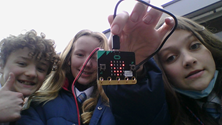Computer Science and IT

Computer Science
The aim of Computer Science is to develop students to become problem solvers and computational thinkers whilst also being aware of the constantly evolving technological landscape. Digital Media is now part of the everyday and constantly evolving. There are three strands to the curriculum for Computer Science: Digital Literacy, ICT and Computer Science. The essence of each is taught throughout the curriculum. Digital Literacy is a focus on functional skills that enable the safe navigation through the world and can be applied across all subjects such as the use of email and standard applications such as the office suite of software (Word, PowerPoint, Excel,) and internet applications e.g. Google Chrome, Google classroom, Google apps. ICT is a focus on the application of software to support human activities considering the design, usability and trustworthiness to work with/develop digital artefacts. Computer Science is a more academic pursuit into the principles of computational thinking (Abstraction, Decomposition, Pattern Recognition and Algorithmic Thinking) and developing new systems through the use of programming techniques.
By the end of Key Stage 3 (Year 7-9) students should:
Know: How to design, use and evaluate computational problems that model and state the behaviour in real world problems.
Know: Basic Boolean logic and how binary works in terms of numbers and movement between denary and binary.
Know: The components that make up computer systems
Be prepared: To use technology safely, respectfully, responsibly and securely, including protecting their online identity and privacy; recognise inappropriate content, contact and conduct and know how to report concerns.
Be able to: Undertake creative projects that involve selecting, using, and combining multiple applications, preferably across a range of devices, to achieve challenging goals, including collecting and analysing data and meeting the needs of known users.
Be able to: create, re-use, revise and re-purpose digital artefacts for a given audience, with attention to trustworthiness, design and usability.
Be able to: Use 2 or programming languages - 1 textual, to solve a variety of computational problems.
![]() Computer Science Year 7-9 Curriculum Plan
Computer Science Year 7-9 Curriculum Plan
By the end of Key Stage 4 (Year 10-11) students who take Computer Science as a specialism should:
Be able to: understand and apply the fundamental principles and concepts of Computer Science, including abstraction, decomposition, logic, algorithms, and data representation.
Be able to: analyse problems in computational terms through practical experience of solving such problems, including designing, writing and debugging programs.
Be able to: think creatively, innovatively, analytically, logically and critically.
Be able to: understand the impacts of digital technology to the individual and to wider society
Know: understand the components that make up digital systems, and how they communicate with one another and with other systems
Be prepared to: apply mathematical skills relevant to Computer Science.
The course that we deliver is OCR GCSE (9-1) Computer Science J277
![]() OCR Computer Science Specification
OCR Computer Science Specification
By the end of Key Stage 4 (Year 10-11) students who take Creative iMedia as a specialism should
Know: about the sectors, products and job roles that form the media industry.
Know: the legal and ethical issues considered and the processes used to plan and create digital media products.
Be able to: show how media codes are used within the creation of media products to convey meaning, create impact and engage audiences.
Be prepared to: choose the most appropriate format and properties for different media products.
Know: how to develop visual identities for clients.
Be able to: apply the concepts of graphic design to create original digital graphics which incorporate their visual identity to engage a target audience.
Be able to: design and create interactive digital media products for chosen platforms.
Be prepared: to select, edit and repurpose multimedia content of different kinds and create the structure and interactive elements necessary for an effective user experience.
The course that we deliver is OCR Cambridge Nationals Creative iMedia Level 1, 2 J834

